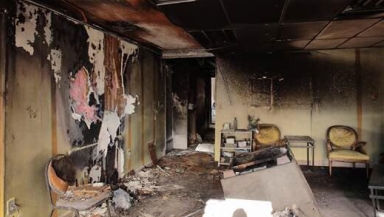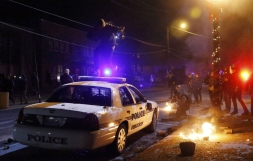
White supremacists have destroyed the church attended by the father of slain Ferguson teenager Michael Brown, according to its pastor.
The Flood Christian Church was burned to the ground on Monday. Its pastor Rev Carlton Lee told NBC news he did not believe that the destruction was part of the wider destruction after the grand jury's clearance of police officer Darren Wilson, who shot Brown. He said the church was targeted by people angry because of his support for the Brown family and his repeated calls for Wilson to be arrested after the shooting.
"The police called me and told me the church was on fire," Lee said. "I was in complete disbelief. I didn't think anyone would set a church on fire.
"I feel like one of my children has died. I put my blood, my sweat, my tears into this church, getting this church built from the ground up. To see that it was taken down in a few minutes is really heartbreaking."
He had baptised Michael Brown Senior, his wife Cal and their children only the day before. Lee told ABC news: "Sunday, we do the baptism, Monday, the church is on fire. It just doesn't add up." Brown was "devastated again" by the news of the fire, he said.
Local churches in Ferguson opened their doors as safe havens for the community in the wake of civil unrest and were helping to clear up after the damage. The rector of St Stephen's Episcopal Church, Rev Steven Lawler, told the Christian Post: "We are a safe haven for children who are out of school because the schools closed yesterday. We have some teachers here and some food and we've been responding to families who have their kids with them today because schools were closed."
Pastor Willis Johnson from Ferguson's Wellspring Church told NPR that it was "a challenge to be hopeful" in the situation. In an address, he said: " The people of Ferguson will continue the hard work of reconciling differences as we strive to understand, trust and listen to each other. And we will continue searching for ways to sustain our hope in systems, leaders and practices."
However, he said: "Whether we acknowledge it – or understand it – or not, every single one of us – inside the city limits of Ferguson and out – remains subject to a series of longstanding historical and cultural problems... This generation, like yours and mine, is forced to wrestle with the unresolved issues and questions of the generations preceding us. There are more questions than answers."














